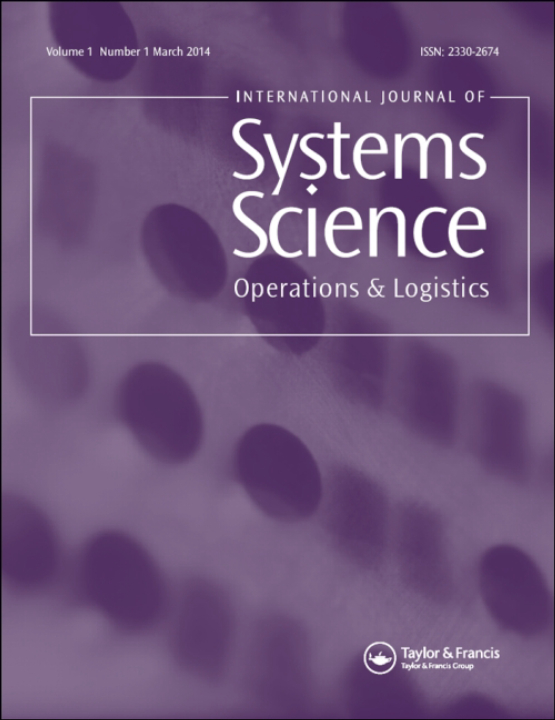Submit a Manuscript to the Journal
International Journal of Systems Science: Operations & Logistics
For a Special Issue on
The value of EOQ in analyzing stochastic inventory systems
Manuscript deadline

Special Issue Editor(s)
Prof. Athanasios G. Lagodimos,
University of Piraeus, Piraeus, Greece
alagod@unipi.gr
Prof. Konstantina Skouri,
University of Ioannina, Department of Mathematics, Ioannina, Greece
kskouri@uoi.gr
Prof. Ioannis Konstantaras,
University of Macedonia, Department of Business Administration, Thessaloniki, Greece
ikonst@uom.edu.gr
The value of EOQ in analyzing stochastic inventory systems
Due to the stochastic nature of several factors entering real production, inventory managers operate in uncertain environments. Key issues that must be addressed for effective inventory management decisions include lot-sizing and safety stock quantification, supplier payment and credit scheme determinations, managing supply yield/losses and disruptions, deteriorating and perishable items management, and dealing with unsatisfied demand. Existing models generally fall within two broad paradigms for formulating effective policies. Stochastic demand (SD) models and Deterministic demand models (usually called EOQ models).
Compared to their EOQ counterparts, SD models are considered more representative of real life. However, even with the latter models, assumptions about the demand process (such as distribution and stationarity) must be made. While this facilitates analysis, it can sometimes prove unrealistic. One can generally state that SD models suffer from the increased complexity of analysis, difficulty in identifying system properties, the necessity for numerical evaluation tools (not available in everyday practice) due to the lack of closed-form solutions, and excessive computing run times that hinder industrial applications. On the other hand, EOQ models are typically simpler in analysis and often (not always) provide closed or semi-closed-form tractable solutions. In addition, even when numerical evaluations are required, these can often be performed easily on a spreadsheet.
Interestingly, research into these two paradigms has historically evolved separately. This special issue aims to bridge this gap by focusing on the following key question: Do EOQ solutions provide good approximations for optimizing SD models? If this can be demonstrated, then efforts should be made to exploit the synergies between the two paradigms. This has the potential to generate practical solutions for complex problems that industry managers naturally understand based on their experience and intuition. Bridging the gap between theoretical models and real-world decision-making ensures that inventory theory becomes more relevant, accessible, and applicable in practice.
Papers submitted to this special issue should cover, but are not limited to, the following areas:
- EOQ-based analysis and approximations for SD models
- Structural relationships between EOQ and SD model solutions
- EOQ bounds for SD model optimization
- EOQ-based heuristics for SD models
- Performance of SD models using EOQ-based solutions
- EOQ versus AI generated solutions for SD models
- EOQ solutions for SD models under auto-correlated demand
Submitted papers can tackle the above for continuous or periodic review and within the context of either single-echelon or multi-echelon settings. An ideal paper for this special issue should provide results for both the EOQ and the SD versions of the systems analysed and discuss their relative performance. This special issue welcomes analytical, simulation, and computational papers, as well as industry case studies.
Profile of guest editors
Athanasios G. Lagodimos is Professor Emeritus of Operations Management at the University of Piraeus. He holds a Dipl.-Ing. in Mechanical Engineering from the University of Patras (Greece), an MSc in Production Management from Cranfield Institute of Technology (UK), and a PhD in Operations Management from the University of Cambridge (UK). Before entering academia in 1995, he held various industrial positions, including Manufacturing Director at a major food production company. He also has extensive consulting experience with businesses across the EU. His research interests focus on supply chain analytics, integrated management systems, and business process management. His work has been published in leading journals such as Omega, the European Journal of Operational Research, the Journal of Production Economics, Computers and Industrial Engineering, and the Journal of the Operational Research Society.
Konstantina Skouri is Professor of Operations Research in the Department of Mathematics at the University of Ioannina (Greece). She earned her degree in 1995, an MSc in Statistics and Operational Research in 1998 and a PhD in Operational Research in 2002, all from the University of Ioannina. Her research interests include supply chain analytics, inventory control, and optimization. Her work has been published in top-tier international peer-reviewed journals including Omega, Naval Research Logistics, the European Journal of Operational Research, the International Journal of Production Economics, Computers and Industrial Engineering. She is a member of the editorial board of seven international journals. She has provided external evaluations for international foundations and universities abroad. She has participated in various research projects.
Ioannis Konstantaras is an Associate Professor of Business Mathematics in the Department of Business Administration at the University of Macedonia (Greece). He graduated from the Department of Mathematics at Aristotle University of Thessaloniki (Greece) in 1999. He obtained an MSc in Statistics and Operational Research from the Department of Mathematics of the University of Ioannina (Greece) in 2001 and earned a PhD in Operational Research from the same department in 2006. His research interests include mathematical modeling and analysis of inventory control systems for supply chain and reverse logistics, production planning and control, and the modeling and optimization of business processes. His scientific work has been published in leading journals such as Omega, the European Journal of Operational Research, the International Journal of Production Research, and the International Journal of Production Economics, among others. He served until recently as the Founding Editor-in-Chief of the International Journal of Systems Science: Operations & Logistics (2014-2024).
Submission Instructions
Submissions Deadline: 31 October 2025
Reviews Due: 15 January 2026
Revisions Due: 28 February 2026
Final Decision: 10 April 2026
Publication Date: TBD
